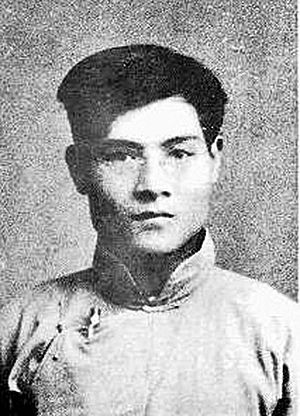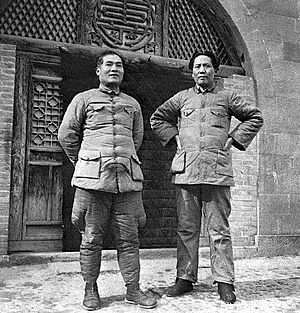Zhang Guotao facts for kids
Quick facts for kids
Zhang Guotao
|
|
|---|---|
| 张国焘 | |

Zhang in 1927
|
|
| Born | 26 November 1897 Pingxiang, Jiangxi, Qing Empire
|
| Died | 3 December 1979 (aged 82) |
| Spouse(s) | Yang Zilie |
| Zhang Guotao | |||||||||
|---|---|---|---|---|---|---|---|---|---|
| Traditional Chinese | 張國燾 | ||||||||
| Simplified Chinese | 张国焘 | ||||||||
|
|||||||||
Zhang Guotao (born November 26, 1897 – died December 3, 1979) was an important person in the early days of the Chinese Communist Party (CCP). He was one of its founding members. He was also a rival to Mao Zedong for leadership.
In the 1920s, Zhang studied in the Soviet Union. He became a key link with the Comintern, an international communist organization. He helped organize workers for the CCP. This was during the First United Front with the Kuomintang, another major political party.
In 1931, the CCP had to leave the cities. Zhang then set up a special area called the E-Yu-Wan Soviet. Later, his armies had to leave this area. He then joined the famous Long March. During this march, he and Mao Zedong had a big disagreement. Zhang lost the fight for party leadership to Mao.
Zhang's armies took a different path from Mao's. They faced tough battles against local forces in Gansu. His forces were greatly weakened. When his remaining troops finally met Mao in Yan'an, Zhang still tried to challenge Mao. But he kept losing influence. He left the party in 1938. Zhang later moved to Canada in 1968. He became a Christian shortly before he died in 1979 in Scarborough, Ontario. His life story gives us valuable information about the early CCP.
Contents
Early Life and Student Days
Zhang Guotao was born in Pingxiang County, Jiangxi province. He was involved in revolutionary activities from a young age. In 1916, he studied Marxism at Peking University. His teacher was Li Dazhao.
Zhang played an active role in the May Fourth Movement in 1919. This made him one of the most important student leaders. He then joined the early group that formed the CCP in October 1920. At that time, Mao Zedong worked as a librarian at Peking University. Zhang and Mao knew each other.
Zhang was a top CCP official at the first National Congress of the Chinese Communist Party in 1921. He was chosen to be part of the Central Bureau of the CCP. His job was to organize professional revolutionaries. After the congress, Zhang became the Director of the Secretariat of the China Labor Union. He was also the Chief Editor of Labor Weekly. This made him an expert in labor unions. He led many big strikes by railway and textile workers. He was a pioneer of the labor movement in China. Other leaders included Liu Shaoqi and Li Lisan.
Joining the Communist Party
In 1924, Zhang attended the First National Congress of the Kuomintang (KMT). This was when the Communists and the Kuomintang worked together. Zhang was elected as a Substitute Commissioner of the Central Executive Committee. This happened even though he had been against working with the Kuomintang earlier.
In 1925, at the Fourth National Congress of the CCP, Zhang was elected to the Central Committee of the Chinese Communist Party. He became the Director of the Labor & Peasant Work Department. In 1926, Zhang was the General Secretary of the Hubei Division of the CCP. In 1927, he was a Commissioner of the Interim Central Committee of the CCP. This was after the CCP uprising failed. Zhang, along with Li Lisan and Qu Qiubai, were acting leaders of the CCP. At that time, Mao only led a small number of troops.
In 1928, Zhang was elected to the politburo of the CCP. This happened at the Sixth National Congress in the Soviet Union. He then became a delegate for the CCP in the Comintern. However, he disagreed with the Soviet Union's ideas about the Chinese revolution. Because of this, Zhang was held and disciplined in the 1920s. But he was famous and popular in the communist world. So, he was not sent away like other people who disagreed.
In 1931, Zhang showed he had changed his mind. The Comintern sent him back to China. His job was to fix problems from power struggles within the CCP. Zhang used his fame to calm things down. He helped old CCP members. But the damage was too great. The CCP found it hard to survive in cities controlled by the Kuomintang. So, Zhang and other CCP leaders decided to move their groups to the countryside.
Zhang was chosen to lead the daily work of the E-Yu-Wan Revolutionary Base. This base was on the border of Hubei, Henan, and Anhui provinces. He was the General Secretary and chairman of the military committee. He also became Vice Chairman of the Interim Central Government of the Chinese Soviet Republic. Mao was the chairman at that time. Zhang carried out very strict actions against people who disagreed.
Leading the Military
In 1932, Zhang led the 4th Red Army into Sichuan. He set up another base there. He slowly made it a successful area. He did this by changing land ownership and getting support from local people. He created the Northwest Chinese Soviet Federation. However, once the area became successful, Zhang again took very strict actions. As a result, he and the Red Army lost public support. They were forced to leave the Red base.
In 1935, Zhang and his army of over 80,000 soldiers met Mao's 10,000 troops. This happened during the Long March. Soon, Mao and Zhang disagreed about military plans. This caused the Red Army to split. Zhang wanted to move south to set up a new base in Sichuan. This area had many ethnic minority groups. Mao explained why this was a bad idea. He said it would be hard to set up a communist base where people were not friendly. Mao insisted on moving north to reach the communist base in Shaanxi.
Zhang tried to have Mao and his followers stopped. But his plan was discovered by his own staff members, Ye Jianying and Yang Shangkun. They went to Mao's headquarters to tell him about Zhang's plan. They also took all the secret codebooks and maps. Because of this, Mao quickly moved his troops north. He escaped being stopped.
Zhang decided to go ahead with his plan alone. This led to terrible results. Over 75% of his 80,000+ troops were lost. Zhang had to admit defeat and go back to the communist base in Shaanxi. Losing most of his troops was bad. But even worse, his failure made his own followers turn to Mao. Also, Mao had all the codebooks. So Zhang lost contact with the Comintern. Mao, however, could talk to them. This, along with Zhang's defeat, made the Comintern support Mao more.
Zhang's remaining 21,800 troops were later destroyed in 1936. They faced a much larger force of over 100,000 soldiers. These were from warlords Ma Bufang, Ma Hongbin, and Ma Zhongying. This happened when Zhang tried to cross the Yellow River. He wanted to take over Ma's territory. Zhang lost his power and influence. He could no longer challenge Mao. He had to accept his failure. Only 427 soldiers survived from his original 21,800.
In 2006, writer Sun Shuyun wrote about the Long March. She said that some parts of the official story were not true. She was critical of Zhang Guotao. But she said there was no proof of a "secret telegram" that Mao supposedly found. This telegram was said to show Zhang wanted to use force against the Central Committee. She also showed that the official history of the Chinese Communist Party was changed in 2002. It now says Zhang Guotao did not order his Western Legion into Gansu to gain power. Instead, all orders came from the Central Committee.
End of CCP Career and Later Life
When Zhang reached the new CCP base at Yan'an, he had lost his power. He became an easy target for Mao. Zhang still held the title of Chairman of Yan'an Frontier Area. But it was just a title. He was often made to feel bad by Mao and his friends. Zhang was too proud to work with Wang Ming. Wang had just come back from Moscow. He was the Comintern's representative in China. Zhang's popularity in the Comintern might have given him another chance if he had worked with Wang.
Another reason Zhang did not work with Wang was something Wang boasted about. Wang said he had ordered the arrest of five senior CCP leaders. These leaders were against Wang. They were later imprisoned and died. After this, Zhang disliked Wang and would never support him.
Zhang had no supporters. He was removed from power in 1937 at a meeting of the Politburo of the Chinese Communist Party. After this, he left the CCP and joined the Kuomintang in 1938. But he had no power, money, or support. He never held any important jobs after that. He only did research on the CCP for Dai Li.
After the Kuomintang lost in 1949, Zhang went to live in Hong Kong. In 1968, he moved to Canada with his wife, Tzi Li Young. They joined their two sons who were already living in Toronto.
In 1974, he gave his only interview. He told a reporter, "I have washed my hands of politics." In 1978, he became a Christian. This was because of a Chinese scholar named Zhang Li Sang. After having several strokes, he died in a nursing home in Scarborough, Ontario, on December 3, 1979. He was 82 years old. He is buried in the Pine Hills Cemetery in Scarborough.
Zhang was very critical of how Luo Ruiqing, the first leader of the PRC Police, acted during the Chinese Civil War.
See also
 In Spanish: Zhang Guotao para niños
In Spanish: Zhang Guotao para niños
 | Aaron Henry |
 | T. R. M. Howard |
 | Jesse Jackson |


